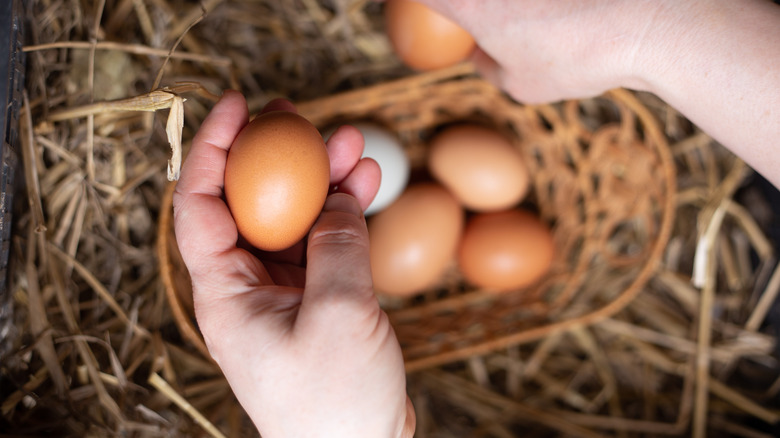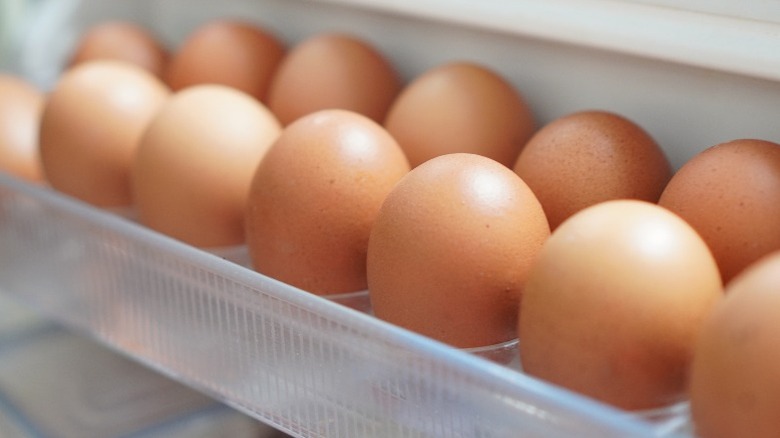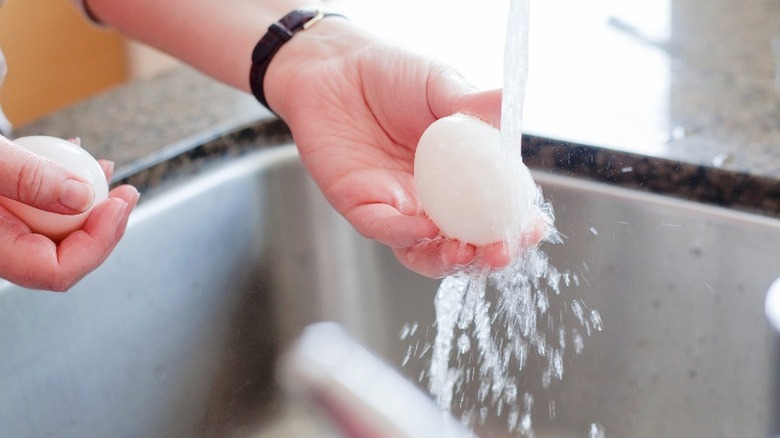Farm-Fresh Eggs Are Safe To Eat, But Here's What To Know First
Thanks to the pandemic, there's been an uptick in the popularity of backyard chickens, even in urban areas. But the pandemic in question wasn't COVID-19, though that certainly impacted plenty of people's finances. Toward the end of the human coronavirus pandemic, an outbreak of avian influenza catastrophically impacted the egg industry. Over 58 million egg-laying chickens were impacted across 47 states, leading to a dramatic rise in the price of eggs. In an attempt to save money, some folks began raising their own chickens for eggs. And between the likelihood or more avian flu outbreaks and the delicious nature of coop-fresh eggs, the trend isn't going away anytime soon. But it's important to understand that you have to be cautious when eating them, especially if you get them from someone else.
Make sure they come from a source you trust. And if you're raising the chickens, egg safety means maintaining a clean coop, handling and cleaning the eggs properly, and preventing contamination from disease carriers (such as wild birds, flies, and rodents). The primary dangers of eating compromised farm-fresh eggs are getting sick from salmonella, E. coli, and parasites. And the risk is real. For example, in 2024, the Centers for Disease Control and Prevention linked an outbreak of salmonella to backyard poultry, with 109 people falling ill after caring for backyard birds.
How to safely handle farm-fresh eggs
Unlike supermarket eggs that have been washed and cleaned, fresh eggs are covered in a layer called the bloom. That's actually a good thing. It's why British people don't refrigerate their eggs; that outer cuticle keeps out bacteria. Unwashed farm-fresh eggs can last up to two weeks at room temperature then refrigerated for up to three months. That's a bit longer than washed store-bought eggs. Eggs only stay good for up to 45 days after washing — and since store-bought eggs have probably been traveling around the country on the way to the store for a couple of weeks by the time you buy them, who knows how old store-bought eggs are?
If you're raising the eggs, it's essential you collect them quickly once laid so they don't sit around in the coop or be exposed to bacteria and feces. Even with the bloom in place, contact with feces heightens the risk of potential illness for anyone handling or eating them. Discard any broken or cracked eggs. The smallest fractures can let in harmful bacteria that you definitely don't want to eat.
After collection, leave the protective bloom intact until you're ready to use them. Eggs with an intact bloom have a dull or dusty appearance. If the egg has feces or the contents of another broken egg on it, use a clean, dry towel to wipe it away gently. And if you find eggs laid in an unusual place and don't know how long they've been there, you can check whether an egg is old using the float test.
Preparing farm-fresh eggs to eat
When you're ready, you can wash the eggs in water warmer than the temperature of the eggs. If they're freshly laid, that means about 135 degrees Fahrenheit. For all other eggs, between 90 and 120 should do it. This causes the egg to expand, which keeps bacteria from getting in through the pores. Cold water could do the opposite. Wash each egg individually with a small drop of unscented soap. Then dunk them in a solution of 1 tablespoon of bleach per gallon of water to sanitize. Then rinse them off and dry them thoroughly before storage. Don't forget to clean and disinfect all the surfaces where you washed the eggs to avoid cross-contamination.
You could stop there or you could pasteurize them. Pasteurization can kill bacteria, making eggs safer to eat runny or raw, but it's not foolproof. Even most store-bought eggs are unpasteurized. Although your sous vide works for pasteurizing eggs at home, it isn't as precise as commercial pasteurization, and it's still recommended to heat eggs thoroughly (meaning not runny) before consumption or toss them if they don't seem fresh.
If you're buying eggs from someone else, you should ask about all these processes too. And if they're in any way cagey about answering simple egg-collecting and hygiene questions, you probably have your answer.


